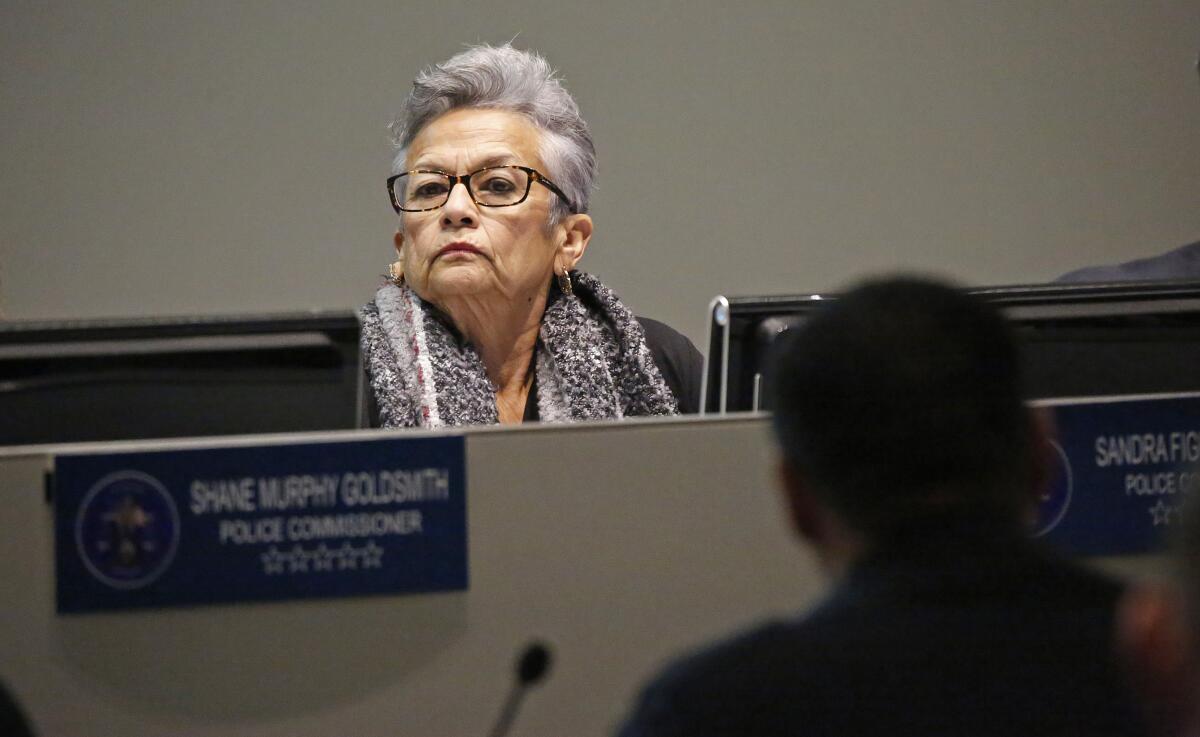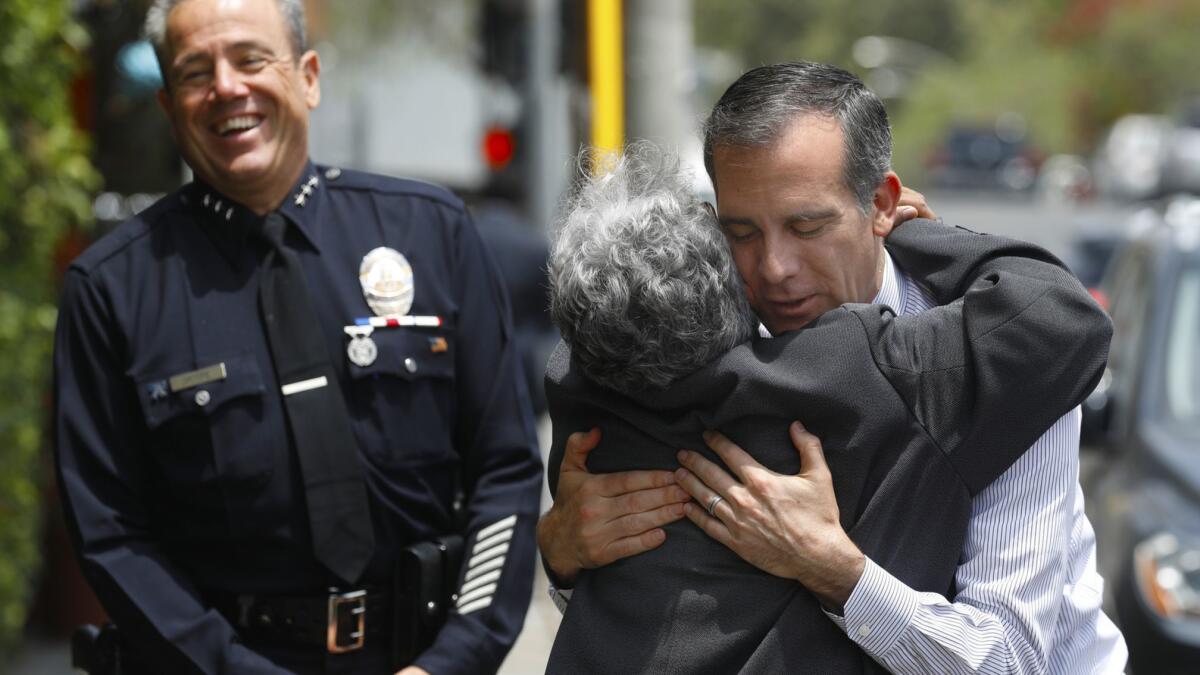LAPD Commissioner Sandra Figueroa-Villa failed to disclose income from city contracts

- Share via
Los Angeles Police Commissioner Sandra Figueroa-Villa failed to disclose income from a nonprofit she runs that received millions of dollars from the city to work with police on gang initiatives, records show.
Figueroa-Villa has never reported her income or the nonprofit’s funding from the city on annual financial disclosures required by the city. She also didn’t disclose a donation that a controversial technology firm with ties to the LAPD made to her group. The commission, including Figueroa-Villa, then voted to audit the program in 2018, according to Ethics Commission records and a transcript of a Police Commission meeting.
Individuals who fail to report information on disclosures could face stiff fines from the Ethics Commission. Figueroa-Villa has not been fined to date.
The Times connected the city contracts to Figueroa-Villa’s nonprofit during an examination of more than 4,000 pages of Police Commission meeting transcripts and agendas, Ethics Commission records and IRS tax forms filed by the nonprofit.
Figueroa-Villa said she did not know she needed to disclose the source of her personal income. Commissioners do not receive a city salary.
“In my mind, I had nothing to report,” Figueroa-Villa said Tuesday. “I didn’t know I was supposed to file that form. Everybody knows we’re a [gang prevention] provider. The Ethics Commission never came back to me; they never questioned my forms.”
The other four police commissioners said they didn’t know about the nonprofit’s millions in contracts with the city or the donation from the technology firm. Each declined to comment. City Atty. Mike Feuer’s office and the Ethics Commission declined to comment when asked whether officials routinely review filings.
Jim Sutton, a political and election attorney who represents clients before numerous ethics commissions and the California Fair Political Practices Commission, said the law requires Figueroa-Villa to disclose her employment on disclosures.
“She clearly has to disclose. That’s a basic violation,” he said. “The public has a right to know that a police commissioner is receiving these contracts.”
The failures to disclose information raise questions about Figueroa-Villa’s role as a “citizens’ voice” on the oversight panel and whether a police commissioner’s nonprofit should receive millions from the city, experts say. The experts raised questions about whether her business ties made her the right person to serve on a city commission.
“Both of these appear to be blatant conflicts of interest, which the public should be concerned” about, said Terry Cooper, professor emeritus at USC Price School of Public Policy.
Figueroa-Villa said she understands how the public could perceive possible conflicts because the nonprofit receives all of its funding from the city and county governments. She has never voted on an item on a Police Commission agenda related to the Gang Reduction and Youth Development program (GRYD), according to a review of records.
Each police commissioner is appointed by the mayor and serves a maximum of two five-year terms. The panel oversees the operations of the 10,000-officer agency, sets Los Angeles Police Department policies and has an inspector general who audits and investigates the department on its behalf.
Mayor Eric Garcetti declined to answer questions about Figueroa-Villa. But Garcetti spokesman Alex Comisar said in a statement that the mayor “expects all city commissioners to be community leaders and serve our city with passion and integrity.”
“Sandra Figueroa-Villa embodies those values every day, both in and out of the commission meetings,” the statement read. “The Mayor is proud to serve alongside Commissioner Figueroa-Villa and appreciates her contributions to make our city safer for everyone.”
Garcetti appointed Figueroa-Villa to the five-member police commission in August 2013. She has been the executive director of El Centro Del Pueblo since 1980 and has been a social activist for decades and a key leader in the Latino community.
Since 2014, the GRYD program, which operates under the mayor’s office, awarded Figueroa-Villa’s nonprofit $7.6 million to work with the Rampart and Northeast police divisions, according to city records.
The contracts’ annual payments are tied to the minimum number of clients served, records show.
El Centro Del Pueblo’s mission is “to help resident-led community development corporations transform distressed communities and neighborhoods into healthy ones — good places to live, do business, work and raise families,” according to its tax filings.
The organization classifies itself as one that “normally receives a substantial part of its support from a governmental unit or from the general public,” according to tax forms. Figueroa-Villa also said she has served on a county oversight panel while the nonprofit receives county dollars to provide mental health services. She said she never listed that in county disclosures and vowed to correct the filings.
As the city continued to award contracts to the nonprofit, Figueroa-Villa’s salary rose in recent years. Since 2013, her annual pay increased from $98,604 to $123,548, tax forms show.
The City Council approved the annual contracts, records show.
The nonprofit’s tax filing for July 2017 through May 2018 shows the organization collected nearly $7 million in donations and paid $5.1 million in salaries.
In 2014, El Centro Del Pueblo won a $400,000 contract to work with the LAPD’s Rampart Division, which serves communities west of downtown Los Angeles.
The following year, GRYD expanded its coverage areas and independent evaluators rated the nonprofit more effective than Children’s Hospital Los Angeles, records show.
The GRYD program then awarded El Centro Del Pueblo contracts for a combined $1.5 million to work with the Rampart and Northeast divisions.
In 2016 and 2017, the nonprofit received $2.8 million. In the 2018-19 contract years, El Centro Del Pueblo received an additional $2.8 million because no other organization applied to provide services, the city said.
Months after Figueroa-Villa joined the commission, Garcetti started raising cash for El Centro Del Pueblo, according to Ethics Commission records.
Between April 2014 and February 2015, Garcetti raised $87,000 through “behested payments,” which are charitable donations made at the request of a politician. Separately, Garcetti raised almost $5 million for GRYD through behested payments, records show.
Garcetti declined to discuss why he raised money for the nonprofit.
An additional $7,500 donation came from PredPol on Aug. 7, 2014. The company pioneered a software program designed to predict where and when crimes were likely to occur over the next 12 hours. The algorithm examines 10 years of data, including the types of crimes and the dates, times and locations where they occurred.
At the time of the donation, the company was looking to expand its program across the LAPD’s 21 geographic divisions, records show. PredPol did not respond to explain the donation to Figueroa-Villa’s nonprofit.
In July 2018, the Police Commission held heated public meetings to address concerns about data programs and unanimously voted the following month for the inspector general to audit three programs, including PredPol.
Figueroa-Villa voted in favor of the audit but did not mention that her nonprofit had received a $7,500 donation from the group, according to a transcript of the meeting provided by the Police Commission.
In an interview, she said she was a new commissioner at the time and Garcetti asked her to accept the money to help sponsor a community event. Looking back, Figueroa-Villa said she would have never taken a donation from a company with ties to the LAPD.
She said she didn’t realize it might be a conflict until Garcetti’s office told her The Times questioned the donation. She said she “will take responsibility” for the donation.
“I don’t solicit contributions. I would never put El Centro Del Pueblo in a position where there would be a conflict of interest,” Figueroa-Villa told The Times. “I do understand the consequences and perception. I didn’t ask for the check.”

She urged Garcetti to accept responsibility and speak about the PredPol donation.
“The mayor needs to raise $7,500 so I can return that money, period” she said. “I don’t need to have that hanging over our head. Never in my 40 years have I had this problem. They threw me under the bus by not discussing it. They left it to my responsibility.”
In response on Tuesday, Comisar, the mayor’s spokesman, said: “Our office frequently works with many nonprofits to organize community events that lift up Angelenos and our communities. That’s what happened in this case.”
Other commissioners have publicly disclosed potential conflicts.
In December 2018 and April, Commissioner Eileen Decker recused herself from voting when a police program involved UCLA, where she said she has taught in the past. Commissioner Steve Soboroff filed a recusal form in March 2017 when a friend of his had ties to a contract for Motorola police radios, according to Ethics Commission records.
Meanwhile, the PredPol program generated headlines in March and April. An internal audit by the Police Commission’s inspector general concluded there was insufficient data to determine if the PredPol software — developed by a UCLA professor in conjunction with the LAPD — helped reduce crime.
LAPD Inspector General Mark Smith found problems with a component used to pinpoint locations of property crimes. Figueroa-Villa did not attend the two meetings at which the commission discussed PredPol, records show.
The Los Angeles Municipal Code, which covers governmental ethics, requires public officials to notify the public about such conflicts. “The member shall file the form even if the member is not present at the meeting,” the law states.
Individuals who fail to disclose information could face penalties up to “$5,000 per violation or three times the amount the person failed to report, properly or unlawfully contributed, expended, gave, or received,” according to the Los Angeles Ethics Ordinance.
Rey López-Calderón, executive director of the good government group California Common Cause, said failing to disclose information makes it hard for the public to believe Figueroa-Villa can be objective when making commission decisions.
“Our whole system is set up to prevent pay-to-play,” he said. “It makes the public think this is what you have to do to fit in. This undermines the public trust in government.”
The Times reported in July that departments across the country scrapped the PredPol program because it did not provide police with new information. Additional changes to LAPD’s PredPol program will go before the commission in the coming weeks.
Figueroa-Villa said she would disclose the donation and file paperwork with the Ethics Commission.
“I’m not going to cover for anybody,” she said. “I told the mayor’s office, ‘I’m telling the truth.’ ”
Times researcher Julia Franco contributed to this report.
More to Read
Sign up for Essential California
The most important California stories and recommendations in your inbox every morning.
You may occasionally receive promotional content from the Los Angeles Times.











